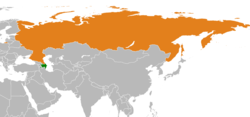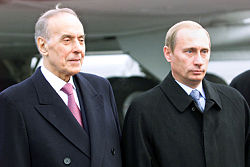Azerbaijan–Russia relations
 | |
Azerbaijan |
Russia |
|---|---|




Bilateral relations exist between the Republic of Azerbaijan and the Russian Federation. The Embassy of Azerbaijan is located in Moscow, Russia. The Embassy of Russia is located in Baku, Azerbaijan.
History[]
Pre-history[]
What is now Azerbaijan became part of the Russian Empire after Qajar Iran was forced to cede it alongside all of its other Caucasian territories following the Russo-Persian War (1804–13) and the outcoming Treaty of Gulistan and the Russo-Persian War (1826–28) and its outcoming Treaty of Turkmenchay. The area to the North of the river Aras, among which the territory of the contemporary Republic of Azerbaijan were Iranian territory until they were occupied by Russia.[1][2][3] Following decades of being part of the Russian empire, Azerbaijan's independence, it subsequently got annexed into the Soviet Union in 1920.
Post-independence[]
After the collapse of the USSR in 1991, relations between the two countries started to get close due to Ayaz Mutallibov's foreign policy.[4] However, after the Armenian occupation of Khojaly, Mutallibov was forced to resign which resulted in Abulfaz Elchibey coming to power. During the one-year rule of Elchibey, Azerbaijan–Russia relations were damaged. Elchibay's politics have been described as "Anti-Russian."[5] When Heydar Aliyev came to power in 1993, he settled warmer relations with Russia. According to President Ilham Aliyev, Vladimir Putin gave Heydar Aliyev a lasting impression, particularly in their shared KGB background.[6]
Russia's weapons transfers to Armenia in 2008[]
At the beginning of 2009 Azerbaijani media published allegations that Russia had made extensive weapons transfers to Armenia throughout 2008 costing about $800 mln. On January 12, 2009 the Russian ambassador was invited to the Azerbaijani Ministry of Foreign Affairs and asked about this information. On January 21, 2009 Russian ministry of foreign relations officially denied the transfers.[7] According to the materials published by Wikileaks in December 2010 Azerbaijani defence minister Safar Abiyev claimed that in January 2009 during his visit to Moscow his Russian counterpart Anatoliy Serdyukov unofficially had admitted weapon transfers although officially it was denied.[8]
Breakdown and renewal[]
After a string of breakdowns in relations took place in the 2010s, including renewal of the lease of the Gabala Radar Station to Russia, and the consequent constructions of a new station in Russia's own Krasnodar Region, the decision by Russia to stop the transit of Azeri oil via the Baku-Novorossiysk pipeline, the holding of the Azerbaijani tanker "Naphthalene" in Dagestan on suspicion of hauling contraband. The discussions involved the issue of regulation of Nagorno-Karabakh, the Caspian Sea legal regime and cooperation in energy. Additionally, an agreement on cooperation and terms for oil supply was signed by the State Oil Company of Azerbaijan Republic (SOCAR) and Rosneft; while there was also an agreement on the construction of a new automobile bridge across the Samur River, on the joint border. The visit took on added importance as it was read as leveraging Armenia–Azerbaijan relations in a warning in light of Armenia considering signing an Association Agreement with the European Union.[9]
Russia expressed reluctance to intervene against Azerbaijan during the 2020 Nagorno-Karabakh conflict, despite its formal alliance with Armenia. This was attributed to deteriorating Armenia-Russia relations following the 2018 Armenian revolution, as well as growing Russian ties with Azerbaijan.[10][11] Russia facilitated peace talks between Azerbaijan and Armenia, culminating in a ceasefire on October 10,[12] though this was later disregarded by both sides.[13]
Modern relations[]
Russia has an embassy in Baku, and Azerbaijan has an embassy in Moscow and consulate-general in Saint Petersburg. Azerbaijan also announced that it will open another consulate-general in Yekaterinburg. There are more than half a million Azeris in Russia as well as a notable diaspora of Russians in Azerbaijan, which is the largest Russian diaspora in the region.[14] President of Russia Dmitry Medvedev stated that the peoples of Russia and Azerbaijan were tied with "closest friendship and trust links".[15] Relations between the two countries remain friendly and close but there are numerous disagreements such as in the first Nagorno-Karabakh War, the South Ossetian-Abkhazian conflict and the legal status of the Caspian Sea. Azerbaijan supported Russia on the Chechnya issue and closed the office of Chechen rebel president Aslan Maskhadov's representative in Baku, as they faced a possible separatist movement by Lezghins (Lezgistan). Some analysts argued that Russia was neutral and somewhat supported Azerbaijan in the Karabakh conflict in the beginning of the 1990s until Elchibey's nationalist government took office, which caused Russia to sign many military agreements with Armenia.[16] Even though this, along with the memory of Black January in 1990, causes distrust of Russia in Azerbaijani society, mainly among nationalists, according to a poll taken in 2007, about of 80% of Azeris approve of the friendship with Russia. After the 2008 war with Georgia, this number dropped to 52%.[17] Russophobia had never been common in Azerbaijan and the government is also strongly committed to protecting the rights of ethnic Russians in Azerbaijan, but hostility exists toward Russians who are married to or otherwise connected with Armenians.[18] Azeris often face discrimination in Russia because of the common "Caucasophobia" after the Chechen Wars, with the main reason considered to be that Russians cannot differentiate between Azerbaijanis and other Caucasian nationalities.[19]
Military and security cooperation[]
Russia is one of Azerbaijan's main suppliers of arms. "As of today, military and technical cooperation with Russia is measured at $4 billion and it tends to grow further," President Ilham Aliyev said after meeting with Russian President Vladimir Putin in Baku in 2013.[20] The leaders of defense departments of both countries make guest visits on a regular basis. On 23–25 January 2006, Russian Minister of Defense Sergei Ivanov visited Baku, followed by Defense Minister Anatoly Serdyukov in November 2007.
On 25 January 2002, an agreement between Russia and Azerbaijan on the status, principles, and conditions for use of the Gabala Radar Station was signed, and on 28 November 2003, an intergovernmental protocol was signed. On June 8, 2007, at the G-8 summit in Heiligendamm, President Vladimir Putin made a proposal to use the Gabala Radar Station as a part of the U.S.-developed missile defense system. The proposal was supported by the Azerbaijani leadership, which considered it as a concrete contribution to stability and security in the region.
Economic relations[]

Trade and economic cooperation between Russia and Azerbaijan is on the rise. In 2008 the trade turnover between the two countries increased annually by 39.3% and amounted to US$2.403 billion, exports grew by 42.6% up to $1.9911 billion, imports increased by 25.4% up to $411.4 million. Despite the end of Russian gas deliveries to Azerbaijan on January 1, 2007, the trade has kept a positive trend, and its structure has evolved towards an increasing share of non-primary goods.
Cultural relations[]

Russian–Azerbaijani relations in culture and education are developing steadily. In December 2006, the two countries adopted a program of interstate cooperation in the humanitarian sphere for 2007–2009. 2005 was the "Year of Azerbaijan" in Russia and 2006 was the "Year of Russia" in Azerbaijan; the two countries held 110 special cultural events during these two years. In 2008, in Baku, a branch of Moscow State University was established. In the universities of Azerbaijan over 15 thousand students are involved in Russian language education. In Azerbaijan, there are over 50 Russian-language newspapers and 10 Russian news agencies.
See also[]
- Foreign relations of Azerbaijan
- Foreign relations of Russia
- Azerbaijan–Russia border
- Azerbaijanis in Russia
- Russians in Azerbaijan
- Armenia–Azerbaijan relations
- Armenia–Russia relations
References[]
- ^ Swietochowski, Tadeusz (1995). Russia and Azerbaijan: A Borderland in Transition. Columbia University Press. pp. 69, 133. ISBN 978-0-231-07068-3.
- ^ L. Batalden, Sandra (1997). The Newly Independent States of Eurasia: Handbook of former Soviet Republics. Greenwood Publishing Group. p. 98. ISBN 978-0-89774-940-4.
- ^ E. Ebel, Robert, Menon, Rajan (2000). Energy and Conflict in Central Asia and the Caucasus. Rowman & Littlefield. p. 181. ISBN 978-0-7425-0063-1.
- ^ An Analysis of Hegemony in Azerbaijani-Russian relations Archived May 28, 2012, at the Wayback Machine
- ^ Cornell, Svante (1 December 2000). Small Nations and Great Powers: A Study of Ethnopolitical Conflict in the Caucasus. Taylor & Francis. ISBN 9780203988879. Retrieved 29 September 2016 – via Google Books.
- ^ "Ильхам Алиев рассказал о первой встрече Гейдара Алиева и Владимира Путина (Видео)".
- ^ "МИД России опроверг информацию о поставках Армении российского оружия на $800 млн". 21 January 2009. Retrieved 29 September 2016.
- ^ "Embassy cables: Truth about Putin and Medvedev – over a bottle of vodka". The Guardian. 1 December 2010. Retrieved 29 September 2016.
- ^ Markedonov, Sergei (16 August 2013). "Reviewing loyalties in Greater Caucasus". Retrieved 29 September 2016.
- ^ "Russia is the only country able to stop the Armenia-Azerbaijan conflict. Will it step up and do so?". CNN. 5 October 2020.
- ^ "Reluctant Russia offers to send peacekeeping 'monitors' to Nagorno-Karabakh". The Independent. 14 October 2020.
- ^ "Armenia and Azerbaijan agree on a ceasefire, Russian foreign ministry says". CNN. 10 October 2020.
- ^ "Nagorno-Karabakh: Armenia and Azerbaijan accuse each other of breaking fresh truce". The Guardian. 18 October 2020.
- ^ "Русская община Азербайджана отметила 15-летие конференцией - ЦентрАзия". Retrieved 29 September 2016.
- ^ "Dmitry Medvedev: Peoples of Russia and Azerbaijan tied with closest friendship and trust links". 25 November 2011. Retrieved 29 September 2016.
- ^ Russian-Azerbaijani relations Alaytic View
- ^ Neither Friend nor Foe Archived November 17, 2011, at the Wayback Machine
- ^ The Status of Minorities in Azerbaijan
- ^ "News.Az – Azerbaijanis need 'different image' in Russia". Retrieved 29 September 2016.
- ^ Azeri-Russian Arms Trade $4 Billion Amid Tension With Armenia Archived 19 January 2015 at the Wayback Machine By Zulfugar Agayev 13 August 2013
External links[]
| Wikimedia Commons has media related to Azerbaijan–Russia relations. |
- Azerbaijan–Russia relations
- Bilateral relations of Russia
- Bilateral relations of Azerbaijan
- Relations of colonizer and former colony

